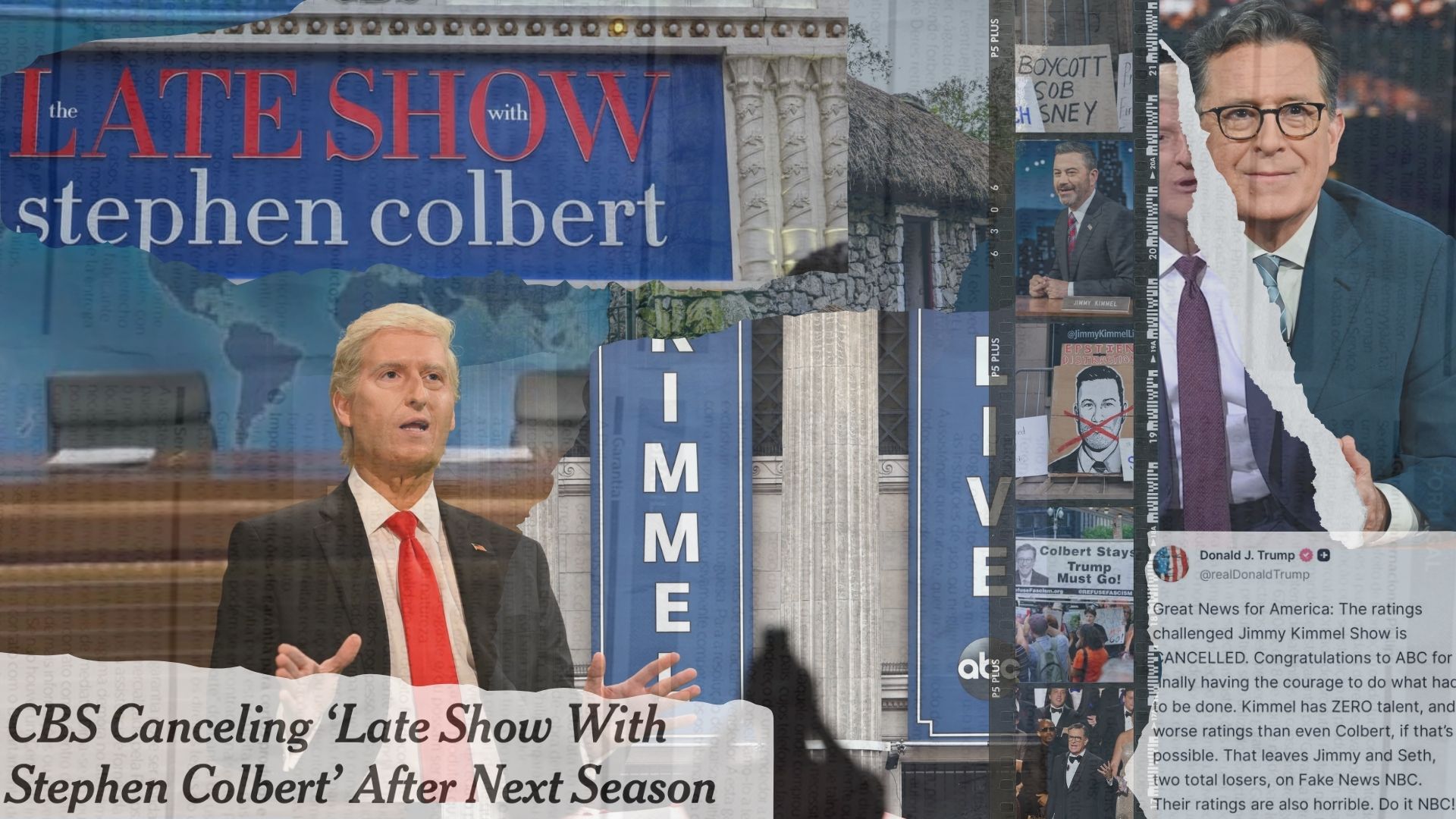I have a strict 11:15 p.m. exit at every Voice party. I’d love to say that it’s because I’m going to another club’s party or participating in some clandestine meetup, but in reality, it’s because that gives me 15 minutes to run back to my dorm, grab my computer, and call my dad so we can watch SNL together.
For context, early in my high school years, I started having panic attacks. Whenever my dad found me anxious, he would take me to the couch and say, “let’s watch something funny.” Thus began a nearly nightly ritual: my dad and I, on the couch, watching something to make us laugh. We would watch sitcoms, Adam Sandler movies, late night shows, and of course, Saturday Night Live, every Saturday night.
Through this attempt to alleviate my anxiety, I became aware of a contradiction. Much of what I was laughing at—James Austin Johnson’s Trump impression, Seth Meyers’ “A Closer Look”, John Mulaney’s (CAS ’04) “Horse in a Hospital”, and Parks and Rec—was parodying the root of many of my fears.
I’m 20 now, and happy to say that Zoloft is now doing a lot of the heavy lifting that Mulaney used to do. And yet, I find myself watching comedy more than ever. Comedy has been an essential comfort for me in so many moments—and recently, I’ve witnessed it enter acute peril.
As I watched SNL’s season premiere on Sept. 4, Johnson, impersonating Trump, told the audience that he was “keeping [his] eye” on SNL and warned that the show had “better be on their best behavior, otherwise they’ll have to answer to my attack dogs at the FCC.” While the joke made me laugh, it also thrust into the spotlight a question I’d asked myself several times over the past few weeks: does Trump let SNL make it through the season?
The idea of a U.S. president mandating a sketch comedy show’s cancellation might have sounded ridiculous years (or even months) ago, but the past several months have proven that political comedy is at risk, with none other than late-night hosts being on the front lines.
On July 17, Stephen Colbert announced that CBS’ The Late Show had been cancelled after 32 years on air. The network, who was then in the process of completing a $8.4 billion merger between parent company Paramount and media conglomerate Skydance, said that this was a “purely financial decision,” with the show losing a reported $40 million a year despite having the highest viewership among late-night shows at his hour.
Two weeks earlier, CBS had paid a $16 million settlement in a lawsuit led by Trump, who alleged that the network’s 60 Minutes interview with then-Vice President Kamala Harris had been deceptively edited. Back in April, 60 Minutes executive producer Bill Owens left his post at the show, saying that amid the lawsuit, it had been made clear that he “would not be allowed to run the show as I have always run it.”
Two days before his cancellation, Colbert had called the settlement a “big fat bribe.” Eight days after Colbert’s cancellation, the Trump-controlled Federal Communications Commission (FCC) approved the merger.
The day after Colbert announced the news, Trump declared on Truth Social, “I hear Jimmy Kimmel is next. Has even less talent than Colbert!”
Well, at least half of that is now definitely true.
ABC announced Sept. 17 that Jimmy Kimmel Live! would be taken off air “indefinitely” after Kimmel made comments about the murder of right-wing influencer Charlie Kirk. The move came after FCC chair Brendan Carr told local broadcasters they were “running the possibility of fines or licensed revocation from the FCC” if they continued to air the show.
While Kimmel’s comments alluding to Kirk’s killer being a political conservative and jokes poking fun at Trump’s seemingly detached reaction to his death could be seen as misleading or insensitive in the wake of Kirk’s assassination, it is unprecedented that a network television host would receive this level of censure as a result. It’s even more unprecedented that an FCC chair would threaten affiliate stations if they broadcast content he doesn’t like, especially content directly criticizing the president.
While ABC reinstated Kimmel on Sept. 23, Sinclair and Nexstar, media conglomerates that own roughly 22% of local ABC affiliates, announced that they would not air the show. So, when my dad sat down at home in Nashville to watch Kimmel’s return, he was greeted with our station’s alternative programming, a documentary about Sumner County, Tenn. that was neither humorous nor entertaining (according to him). On Sept. 26, both companies allowed Jimmy Kimmel Live! to return to their airwaves.
We now have two Jimmies on late night television again, though Kimmel’s reinstatement seems less like a victory and more like a return to some modicum of free speech. At this moment, when I am filled with more anxiety than ever about the state of our country, our government, and our world, concentrated attacks are being directed at my outlet to find peace. And those two things are not disconnected.
It is truly sinister to silence one’s critics. The Trump administration has gone after journalists, activists, and opposing political leaders. And there is something equally unsettling about robbing the public of the opportunity to access political commentary by cutting public broadcasting, especially in a time of increased paywalls and moves to streaming.
It seems silly—in a time where ICE raids are tearing families apart, U.S. bombs are killing civilians abroad, and the National Guard patrols our nation’s capital—to complain about late-night comedy getting hit. But there is cause for legitimate concern: these attacks on late-night comedy are part of how leaders hope to normalize and continue attacks on basic human rights. Kimmel himself said it best: “This show is not important. What is important is that we get to live in a country that allows us to have a show like this.”
Comedy is important, not in spite of this dire authoritarian moment, but because of it. Comedy teaches us that we can laugh and smile at what is tearing us apart inside. It is messy, it is at times problematic, and like us and our country, it often falls short of what it needs to be.
But even more than a coping mechanism, laughter is a form of resistance. Laughter shows authoritarians and those who support them that though they can strip rights once thought fundamental, there remain some joys they cannot steal. It does not imply that what is happening is funny—it does imply that we deserve to have an opinion about it, though.
Attacks on comedians and satirists are not new; they’re a time-honored authoritarian tradition. On a recent weekend trip while I study abroad in Ireland, I found myself in the Galway City Museum. As I walked through an exhibit on early Irish civilization, plaques described the roles of different professions in early Gaelic cultures, including poets, or ‘filí’ in old Irish. Filí were responsible for memorizing and verbally relaying a tribe’s history, and were also the main producers of political satire. According to a plaque at the exhibit, their satire was so powerful that it could contribute to the “disfigurement and even death” of leaders, and thus for political and symbolic reasons, Gaelic court filí lived in borderlands.
However, the job of filí morphed as the monarchs of England began their conquest of Ireland, eroding traditional Irish civilization and banning their native language. As the Irish people lost control of their home to colonial violence, filí continued recording ancient traditions, practices, and culture in the language they would later be forced to give up. As a result of their satire and attempts to keep Irish tradition alive, the English persecuted Irish filí, bards, and musicians, arresting them and confiscating their lands as they deemed them a threat to successful colonization. Today, the silencing of the late-night hosts I know and love is not dissimilar from the silencing of the filí read by my direct ancestors living on both sides of the colonially-imposed border of what is now considered “Northern Ireland.”
History repeats itself: as anti-intellectualism and the censure of journalists, students, and civilians grows, the aim of our leaders is not just to silence those who criticize them, but also silence those who keep record of, and thus publicize, their actions. This is not unique to the U.S. or Ireland: it has happened countless times in regimes across the globe, and as Kimmel noted in his return monologue, comedians in Russia, Pakistan, China, Venezuela, Myanmar, and many other countries currently face government backlash for their jokes.
While it might seem silly to compare Jimmy Kimmel to a 17th century bard, his jokes about this administration simultaneously call out the absurdity of their actions and remind us that those actions continue to occur. When a government wants to move in silence, their greatest threat is speech—especially publicized, critical speech.
Jimmy Kimmel and Stephen Colbert will likely be fine after attacks on their shows, with their million-plus dollar bank accounts, whiteness, and subsequent ability to physically remove themselves from many of the horrors that marginalized Americans are facing every day. Like in most other situations, it is the American people who will be most affected, losing access to the thing that quells our fears and also empowers our concern.
What is happening on the ground in American cities and suburbs is far scarier than what has happened to late-night television hosts. But without those shows, we lose the fundamental right to see what is happening and publicly call it out.
Don’t fight for comedians, but rather, stand up on behalf of all of those harmed by this administration whose real-life experiences have now become taboo to speak aloud. In this time of frustration, suffering, and fear, I make a modest proposal: laugh, and then fight. In letting our country be made fun of, we prevent freedom from becoming the punchline.






